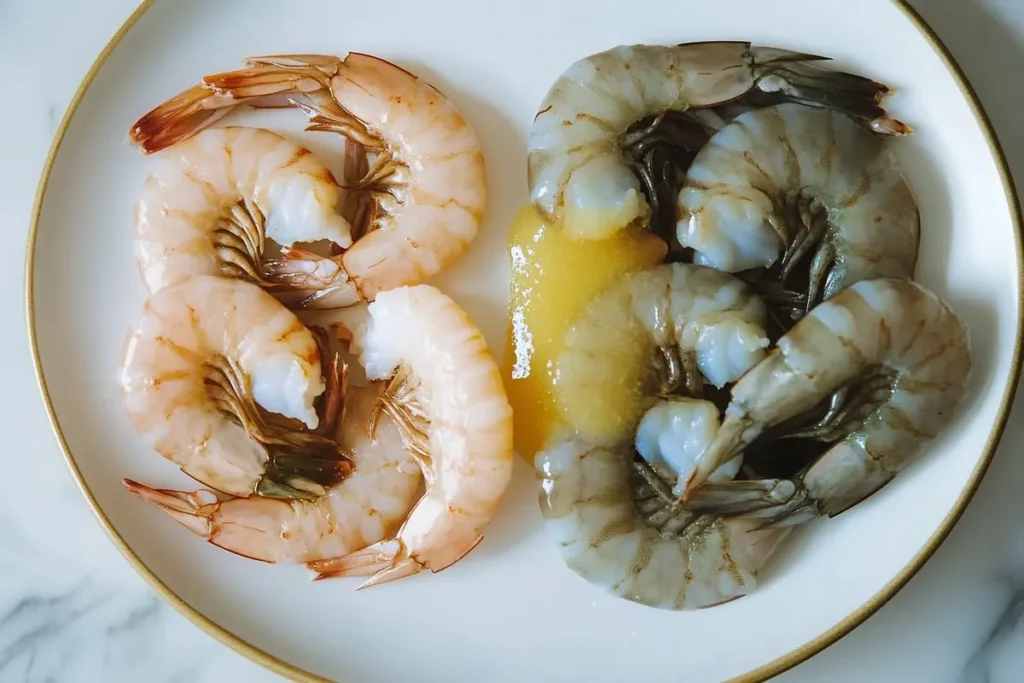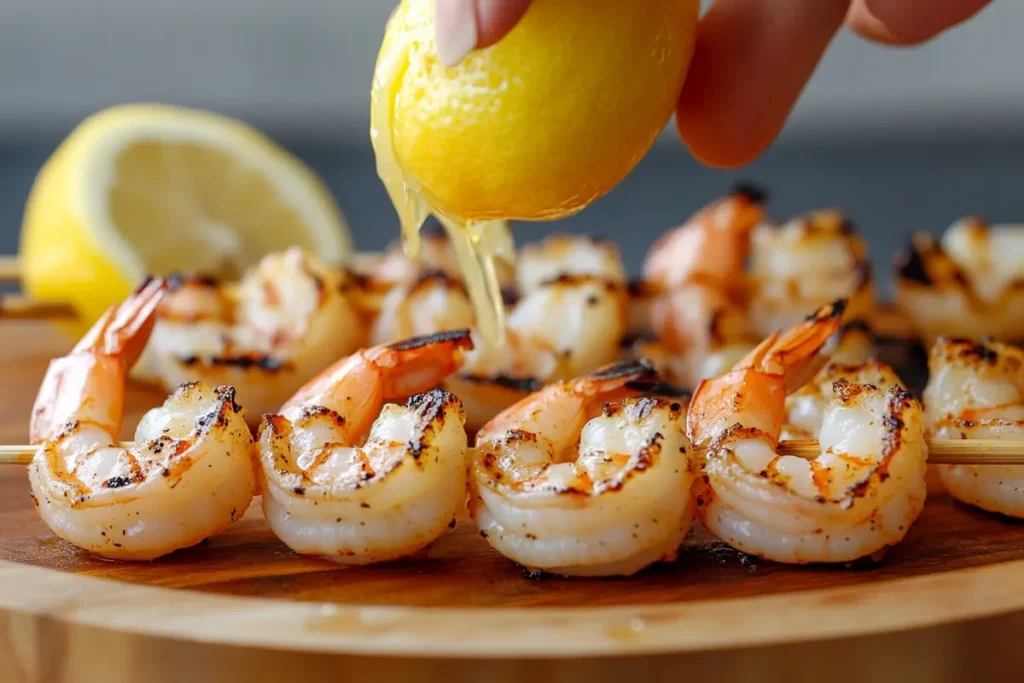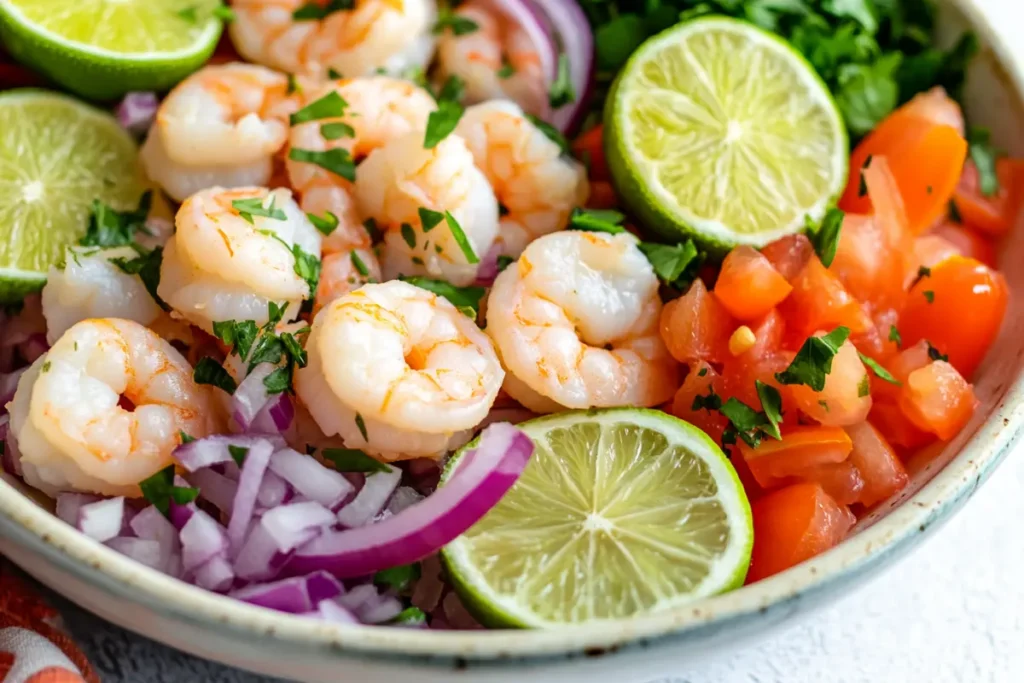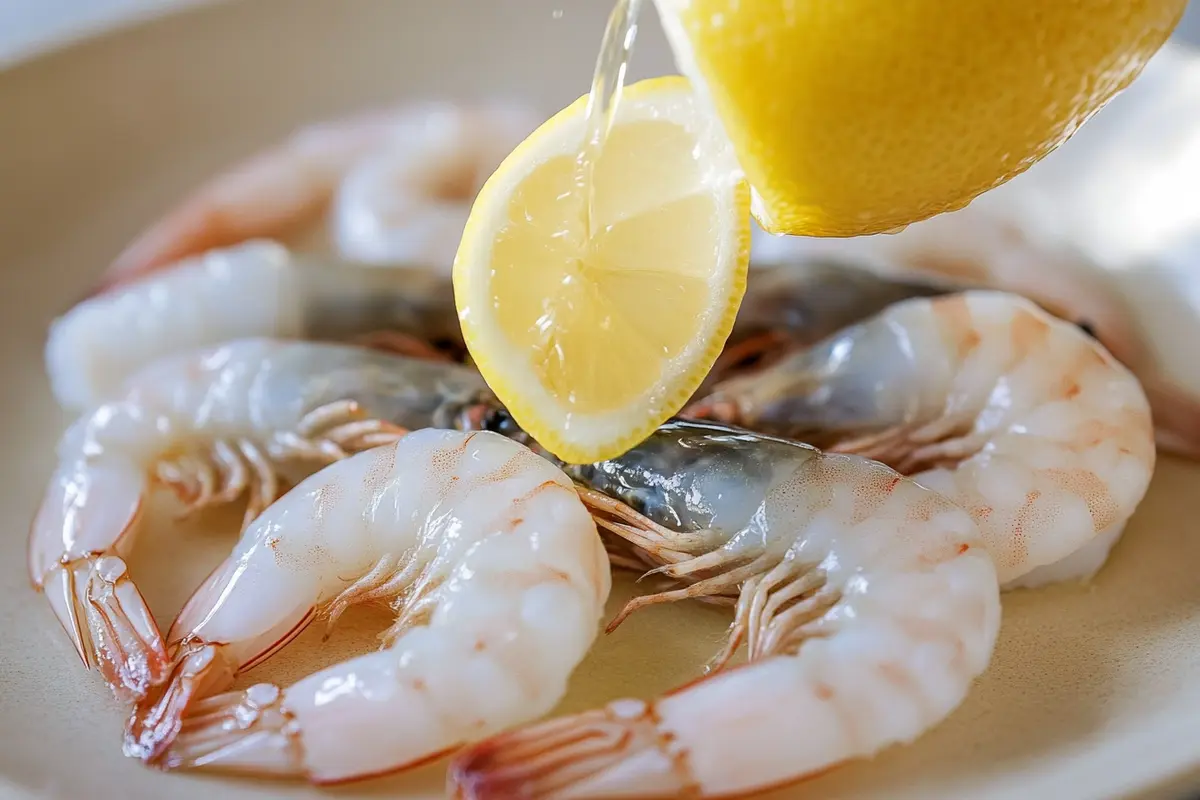Have you ever wondered what does lemon juice do to shrimp? It’s a common ingredient in many shrimp recipes, but its effects go beyond just adding a tangy flavor. Lemon juice is a versatile tool in the kitchen, and understanding its role in seafood preparation can transform your cooking. Therefore, we will explore the science behind using lemon juice on shrimp.
How Lemon Juice Affects Shrimp Texture

The most significant effect of lemon juice on shrimp is its impact on texture. When you expose shrimp to lemon juice, the citric acid causes the proteins to unfold and realign. This process results in the shrimp becoming firmer. Therefore, the texture shifts from soft and translucent to firm and opaque. The level of firmness depends on several factors including:
- The amount of lemon juice used
- The time the shrimp is exposed to the lemon juice
- The size and type of the shrimp.
However, over-marinating can also make shrimp tough and rubbery. Therefore, it is essential to use the right amount of lemon juice and marinate for the appropriate length of time.
The Science of Denaturation
Denaturation is the core process behind the textural change in shrimp when using lemon juice. The proteins in shrimp are folded into specific three-dimensional shapes. However, the acid in lemon juice disrupts these bonds and causes the proteins to unfold. These unfolded proteins then interact with each other, creating new bonds. This reshuffling makes the shrimp firmer and more opaque. Consequently, the textural changes caused by lemon juice are similar to the effects of cooking with heat. For example, both heat and lemon juice cause proteins to denature. Therefore, careful application of lemon juice can provide a good way to partially “cook” shrimp. This is the key to dishes like ceviche
Flavor Enhancement: Beyond the Tang

Lemon juice doesn’t just change the texture of shrimp; it also significantly improves its flavor profile. The natural tartness of lemon juice adds a bright, zesty note that complements the mild, slightly sweet taste of shrimp. This acidity is critical in balancing the overall flavor of many dishes. In addition, lemon juice helps reduce any fishy odors associated with fresh shrimp. This makes the dish more appealing, especially for those sensitive to seafood smells. Furthermore, the acidity helps to cut through the richness of any sauces or dressings in the dish. Thus, lemon juice adds depth and complexity to the taste of shrimp. For instance, a simple squeeze of lemon juice over grilled shrimp can elevate the whole dish.
Balancing Flavors with Lemon Juice
The acidic nature of lemon juice makes it a perfect ingredient to balance flavors in various dishes. It provides a counterpoint to fatty or rich flavors. For instance, in a creamy shrimp pasta dish, lemon juice cuts through the heaviness, making it more enjoyable. It also enhances the flavors of other ingredients, making them brighter and more vibrant. In addition, it is a wonderful pairing for spices and herbs, helping them become more pronounced. Therefore, by strategically using lemon juice, you can create a more well-rounded and flavorful dish.
Lemon Juice as a Preservative
Besides changing texture and flavor, lemon juice also has preservative qualities. The acidic environment created by lemon juice can inhibit the growth of harmful bacteria. Because seafood, including shrimp, can be prone to spoilage, using lemon juice helps extend its shelf life for a little longer. However, it’s essential to note that lemon juice shouldn’t be the sole method of preservation. It’s a helpful aid, but still, proper refrigeration is key when it comes to food safety. Therefore, use lemon juice as a helping hand, but remember safe storage too.
How Lemon Juice Slows Bacterial Growth
The acidity in lemon juice disrupts the environment in which many bacteria thrive. Bacteria generally prefer neutral pH levels; the acidic environment created by lemon juice makes it difficult for them to grow. Furthermore, this antimicrobial property helps to reduce the risk of foodborne illness. For instance, adding lemon juice to a shrimp salad might slow down bacterial growth. However, it is not a substitute for proper handling and storage techniques. Therefore, it is a good extra tool in your food safety practices.
Lemon Juice in Different Shrimp Dishes

The versatility of lemon juice means it can be used in a variety of ways with shrimp. It is a key component in marinades, sauces, and dressings. Lemon juice is also great as a finishing touch, squeezed over cooked shrimp. Therefore, here are a few examples of how lemon juice is used in different shrimp dishes:
- Shrimp Ceviche: In ceviche, raw shrimp is “cooked” entirely by the acidity of lemon or lime juice. This results in a dish where shrimp is firm but tender and full of flavor. In addition, the lemon juice provides the main cooking process for this dish.
- Grilled Shrimp: A squeeze of lemon juice after grilling enhances the smoky flavor. It is simple yet effective, adding a bright and fresh taste. For example, a lemon-herb marinade can also be used before grilling for added flavor and tenderness.
- Shrimp Scampi: Lemon juice is a key ingredient in shrimp scampi, balancing the richness of the butter and garlic. It provides a tangy contrast, ensuring the sauce isn’t too heavy. Also, a touch of lemon zest adds extra flavor.
- Shrimp Salad: A lemon juice-based dressing not only adds flavor but also acts as a preservative. It helps keep the salad fresh for longer, especially during picnics or hot summer days. Additionally, a lemon juice dressing can help cut through the richness of mayonnaise-based dressings.
- Shrimp Pasta: Lemon juice adds a burst of freshness to shrimp pasta dishes. It brightens the flavors and is particularly good with creamy sauces. Therefore, it enhances both the taste and texture of the dish.
Marinating with Lemon Juice
Marinating shrimp in lemon juice can enhance flavor and tenderness. The citric acid helps to break down the proteins, resulting in a more tender texture. However, it is crucial not to marinate shrimp for too long. Over-marinating can cause the shrimp to become tough and rubbery. Generally, a 30-minute marinade is enough for small to medium sized shrimp. Furthermore, a shorter marinade is fine for smaller shrimp. Therefore, always watch your timing. Also, consider your ingredients when marinating.
Choosing Fresh or Bottled Lemon Juice
When using lemon juice for shrimp, the choice between fresh and bottled lemon juice can impact the results. Freshly squeezed lemon juice has a brighter, more vibrant flavor. It contains essential oils that enhance the taste. Bottled lemon juice, while convenient, may lack the freshness and complexity of fresh lemon juice. It can sometimes have a slightly more artificial or processed flavor. However, bottled lemon juice is fine in a pinch. Therefore, for the best results, fresh lemon juice is the preferred choice.
The Benefits of Fresh Lemon Juice
Fresh lemon juice offers a superior flavor profile due to its volatile compounds and natural oils. These compounds are often lost or diminished in bottled lemon juice. In addition to better flavor, fresh lemon juice has better acidity, which will benefit your dishes. Also, fresh lemon juice has no added preservatives or additives. Therefore, it is a natural choice that can improve the final product. For example, freshly squeezed juice gives the best results in delicate dishes like ceviche.
Potential Downsides of Using Too Much Lemon Juice
While lemon juice is beneficial to shrimp, using too much can have negative consequences. Over-marinating in lemon juice can make shrimp tough and rubbery. This occurs when the proteins are denatured too much. Similarly, excessive lemon juice can overpower the natural flavor of shrimp. It can result in an overly acidic dish. Therefore, it is crucial to use lemon juice in moderation. In addition, taste as you go, and add more as needed. For example, start with a small amount of lemon juice and add more as you go.
Balancing Acidity in Recipes
Balancing the acidity in your shrimp recipes is important. Too much acidity can make a dish unpalatable. Therefore, you may need to add sweetness or fat to balance the flavors. A small amount of sugar or honey can be used to counteract acidity. A bit of olive oil or butter can also reduce the tartness. In addition, you can use other ingredients to mellow out the tartness of lemon juice. Therefore, these tips are useful if you accidentally add too much lemon juice.
The Timing of Adding Lemon Juice
The timing of when to add lemon juice also impacts the final outcome. For marinades, you might apply lemon juice before cooking to tenderize the shrimp. However, you should not let it sit for too long. For finishing dishes, squeezing lemon juice at the end brightens the flavors without over-cooking the shrimp. In addition, the timing depends on what you’re trying to achieve. Therefore, think about how lemon juice will work in the dish, and use that to guide your timing.
Marinating vs. Finishing with Lemon Juice
Lemon juice is used in different ways depending on the dish. Marinating uses the lemon juice to change the texture and flavor of shrimp. Finishing with lemon juice enhances the existing flavor and adds a fresh zing. Consider using lemon juice before cooking for tenderizing purposes. Use it as a finishing ingredient to add a fresh citrus flavor. Also, consider what flavor profile you are going for. Therefore, the timing depends on the type of dish.
Alternatives
While lemon juice is the most common acidic ingredient used for shrimp, other options exist. Lime juice is a good alternative, providing a similar level of acidity with a slightly different flavor profile. Vinegar, such as white wine vinegar or apple cider vinegar, can also be used. Each has a distinct flavor that can impact the final dish. Therefore, you can choose the right acidity to match your dish’s profile.
Lime Juice and Other Acidic Options
Lime juice offers a similar effect as lemon juice when used on shrimp. It is slightly sweeter but equally acidic. However, it provides a more tropical flavor profile, which might be good in some dishes. Vinegar, with its sharp flavor, needs to be used sparingly. For example, small amounts of white wine vinegar can be used in a shrimp marinade. Therefore, experiment with different acids to see what tastes best.
Practical Tips for Using Lemon Juice with Shrimp
To get the most out of using lemon juice with shrimp, consider these practical tips. First, always use fresh lemon juice for the best flavor. Second, marinate shrimp for a limited time. Third, taste and adjust seasonings as you go. Fourth, add lemon juice at the end for a fresh, bright flavor. In addition, be mindful of using too much lemon juice. Therefore, always follow these steps for a great final product.
Avoid Over-Marinating Shrimp
Over-marinating shrimp in lemon juice can result in a rubbery texture. Keep the marinade time short, generally less than 30 minutes for smaller shrimp. For larger shrimp, a 30-minute marinade is more appropriate. Therefore, it is better to slightly under-marinate than to over-marinate. Additionally, it is good practice to keep an eye on the shrimp while marinating.
Conclusion
Lemon juice is a versatile ingredient that transforms shrimp in several ways. It denatures the proteins, making shrimp firmer. It also enhances flavor, adding a tart and bright note that complements the shrimp. Additionally, lemon juice acts as a preservative, slowing bacterial growth and extending shelf life. However, be cautious not to use too much, as it can toughen or overpower the dish. Understanding lemon juice’s effects helps you use it effectively in shrimp recipes, whether for marinating, flavoring, or preserving. It’s a must-have for seafood lovers.
The Zesty Science of Seafood Cooking
In the end, understanding what does lemon juice do to shrimp is essential for any home cook. It allows for better cooking and a more in-depth experience with your meals. The science behind lemon juice is complex, but the effects are undeniable. With this knowledge, you can now use lemon juice with greater confidence. Therefore, go forth and experiment with lemon juice and shrimp. Also, enjoy making delicious seafood dishes.
Frequently Asked Questions
Why add lemon juice to pasta sauce?
Lemon juice is often added to pasta sauce to enhance its flavor and balance its acidity. The tartness of lemon juice cuts through the richness of the sauce, providing a brighter, fresher taste. It is also useful in countering any excessive sweetness or bitterness that might be present in the sauce. For instance, a pinch of lemon juice can elevate a simple tomato sauce. In addition, it also helps the other ingredients pop.
When should you add lemon juice to a sauce?
When adding lemon juice to a sauce, consider when you want to emphasize its flavor and acidity. For a bright, fresh taste, add lemon juice toward the end of cooking, just before serving. When you are using lemon juice as a tenderizer or a flavor enhancer, you might add it during the cooking process. Therefore, the best time to add lemon juice to a sauce depends on the effect that you are trying to achieve.
Does lemon juice change the taste of tomato sauce?
Yes, lemon juice does change the taste of tomato sauce. It adds a bright, tangy flavor that balances the sweetness and richness of tomatoes. It also enhances the other flavors in the sauce, making them more pronounced. However, using too much lemon juice can make the tomato sauce overly acidic. Therefore, you should add it gradually and taste as you go.
Why do chefs use lemon juice?
Chefs use lemon juice for various reasons in cooking. It acts as a flavor enhancer, adding acidity and brightness to dishes. It also functions as a tenderizer for meats, breaking down proteins for a more tender texture. In addition, lemon juice has preservative properties, helping to slow down the growth of harmful bacteria. Therefore, the versatile properties of lemon juice make it a staple ingredient in many kitchens.

